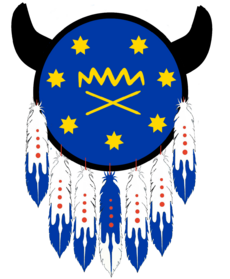Council of Seven Fires
This article is incomplete because it is pending further input from participants, or it is a work-in-progress by one author. Please comment on this article's talk page to share your input, comments and questions. Note: To contribute to this article, you may need to seek help from the author(s) of this page. |
Council of Seven Fires ᎠᏯᎸ ᎤᏓᏅᏖᏂᏓ ᏍᎪᎯᏏ ayvli udanvtinida sgowihvsgi | |
|---|---|
| Council of Seven Fires | |
 | |
| Type | |
| Type | |
Term limits | No |
| History | |
| Founded | July 15, 1910 |
New session started | July 22, 2024 |
| Leadership | |
Chiefs | List of Meoquanee Chiefs since 2022 |
| Seats | 50 |
| Constitution | |
| The Great Law of the Meoquanee | |
The Council of Seven Fires (ᎠᏯᎸ ᎤᏓᏅᏖᏂᏓ ᏍᎪᎯᏏ) is the highest council comprising Chiefs chosen from the nation-level councils. It serves as the primary legislative and deliberative body of the Confederation. Composed of hereditary sachems known as Hoyenah, or chiefs, from each clan, the Council is responsible for major decisions and policy-making.
Composition
The Grand Council of the Six Nations is an assembly of 56 Hoyenah (chiefs) or sachems. When a leadership position becomes available, a candidate is chosen from within the clan and is ceremonially "elevated" by the local council consisting of all sachems. Upon assuming the role, the new sachem relinquishes their previous name and is henceforth addressed by their title.
Currently, the distribution of seats on the Council among the Seven Nations is structured as follows:
- Nasawi: 10 seats
- Wyanwa: 8 seats
- Kathanti: 9 seats
- Aelamet: 7 seats
- Ashwaki: 8 seats
- Dohute: 8 seats
Consensus in public actions is vital to the Council's operations. For amendments to Council laws and customs, a two-thirds consent from the Clan Mothers is mandatory. Major changes require a double supermajority for approval. Additionally, no treaty becomes binding unless it garners ratification from at least 75% of the male voters and 75% of the Clan Mothers within the nation.